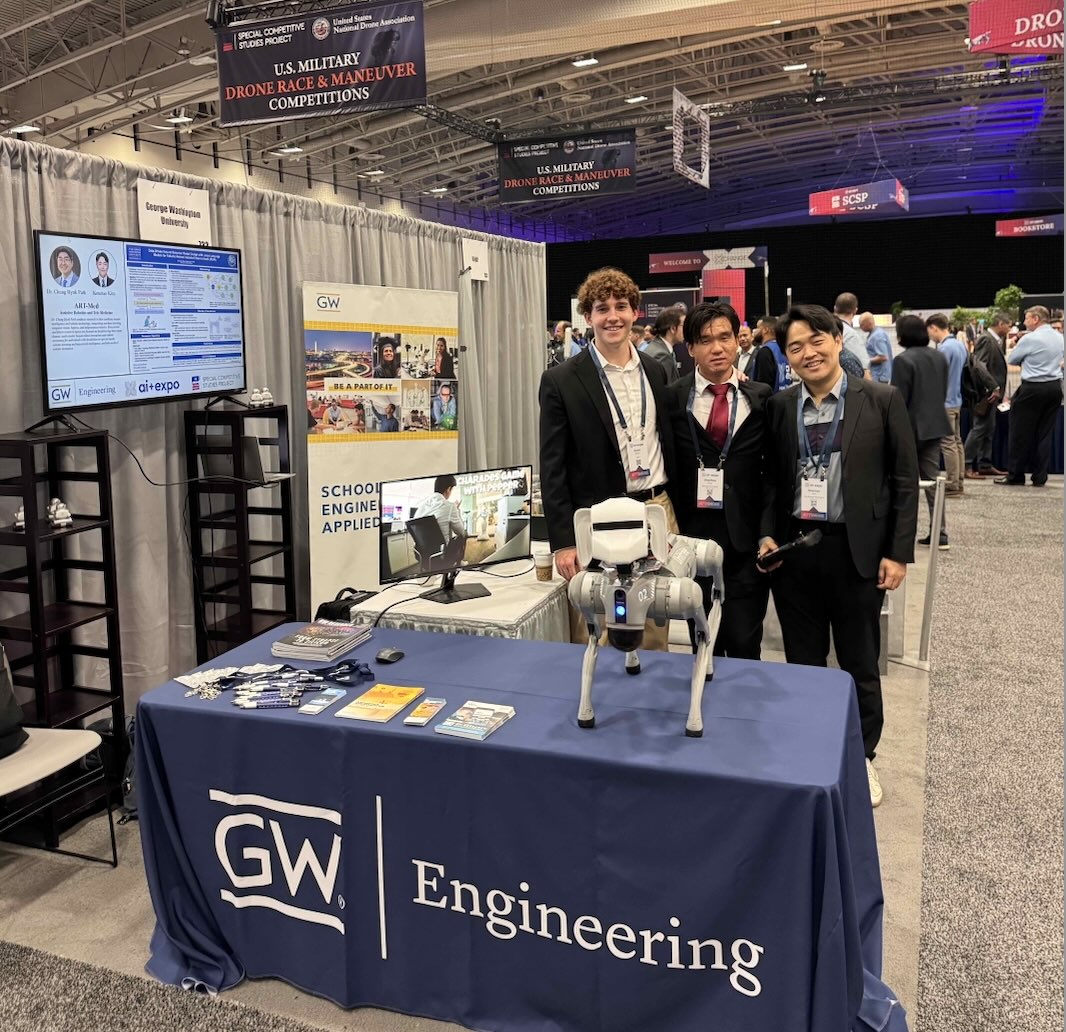Every year, the Special Competitive Studies Project (SCSP) convenes members of government, academia, and industry from across the globe at its AI+EXPO event to share critical insights on artificial intelligence (AI) and emerging technologies, with a special focus on national security. From macroscopic systems like resilient power grids to microscopic brain-inspired computer chips, GW Engineering’s AI-focused research was on display from June 2 to 4 at the 2025 SCSP AI + EXPO in Washington, D.C.
GW Engineering’s booth featured cutting-edge research from GW’s Co-Design of Trustworthy Artificial Intelligence Systems (DTAIS) program and four labs.

Participating labs included Professor Peng Wei’s Intelligent Aerospace Systems Lab, Professor Gina Adam’s Adaptive Devices and Microsystems Lab, Professor Chung Hyuk Park’s Assistive Robotics & Tele-Medicine (ART-MED) Lab, and Professor Payman Dehghanian’s Smart Grid Lab. Students from each group presented their work during dedicated time slots, while a rotating slideshow highlighted additional faculty-led projects not represented in person.
Aidan Schurr, a rising junior in biomedical engineering who attended last year’s event as a visitor, led the initiative to bring GW Engineering to the EXPO. He was struck by the school’s absence, as it closely aligns with GW Engineering's mission and vision.
“The conference was a compelling showcase of how technology and global strategy converge—precisely the intersection that inspired me to pursue my undergraduate studies in biomedical engineering at GW. As I left the conference, I couldn’t help but wonder: could I get GW involved somehow?” Schurr said.
That question quickly turned into action after he contacted Professor Park, who immediately offered support. With additional help from Ben Vergara, a Ph.D. candidate in electrical engineering, and Abbey Kollar, a Ph.D. candidate in systems engineering, they coordinated an exemplary showcase of GW Engineering research.

While the research covered various applications of AI, the school’s unifying theme was trustworthy AI. DTAIS students engaged attendees in conversations about what it means for algorithms to be safe, reliable, and transparent. In line with this, Park’s ART-MED Lab demoed assistive robots designed to help alleviate symptoms of Autism Spectrum Disorders, sparking discussions on trustworthy medical care in the rise of non-human players.
Meanwhile, the Smart Grid Lab used a small-scale model of GW’s Foggy Bottom campus to demonstrate how an AI fault detection algorithm could mitigate the damage of a power outage.
This direct focus on research was unique among the other universities present at the conference and offered a first-person perspective on AI research at GW Engineering. By staffing the booth, students were able to share their work and answer questions from the over 100 attendees who stopped by, gaining valuable experience presenting research and representing GW Engineering on a national level.
“For me, the most rewarding moments were when GW alumni stopped by the booth and expressed how happy they were to see GW showcasing AI research,” said Schurr. “I felt proud to help grow our story as a multidisciplinary institution focused on impact-directed research.”
GW Engineering’s presence at the 2025 AI+EXPO event wouldn’t have been possible without the work of Schurr. Reflecting on this experience, Shurr offered this advice to other students considering taking on a similar endeavor: “The first thing I’d tell any student is to recognize the power of where you are—Washington, D.C.”
“This city isn’t just a backdrop; it’s an engine for global change. Education doesn’t stop at the classroom door, and mentorship isn’t limited to professors. Here, professionals, policymakers, entrepreneurs, and advocates are often just a conversation away. Many of them are more than willing to share their time and insight if you’re willing to ask. Take advantage of that,” said Schurr. “You’re not just a student at GW—you’re a student in the heart of one of the most connected cities in the world.”
Schurr shares that one of the most valuable lessons he’s learned at GW is that the professors are not only here to teach but to create. He recently co-founded a STEM magazine, The Catalyst, which connects researchers from across disciplines to spark new ideas and conversations. From offering interviews and feedback to connecting him with other researchers, the assistance he received for this effort further demonstrates how dedicated faculty are to supporting student-led efforts and the momentum you can build when you take the initiative.
Faculty and students interested in participating in next year’s AI+EXPO event can contact Schurr at aidan [dot] schurr![]() gwmail [dot] gwu [dot] edu (aidan[dot]schurr[at]gwmail[dot]gwu[dot]edu). With additional support, GW Engineering hopes to expand its presence on the national AI stage, creating a platform to foster collaboration among departments and showcase the school’s leadership in ethically grounded, impact-driven AI research.
gwmail [dot] gwu [dot] edu (aidan[dot]schurr[at]gwmail[dot]gwu[dot]edu). With additional support, GW Engineering hopes to expand its presence on the national AI stage, creating a platform to foster collaboration among departments and showcase the school’s leadership in ethically grounded, impact-driven AI research.


